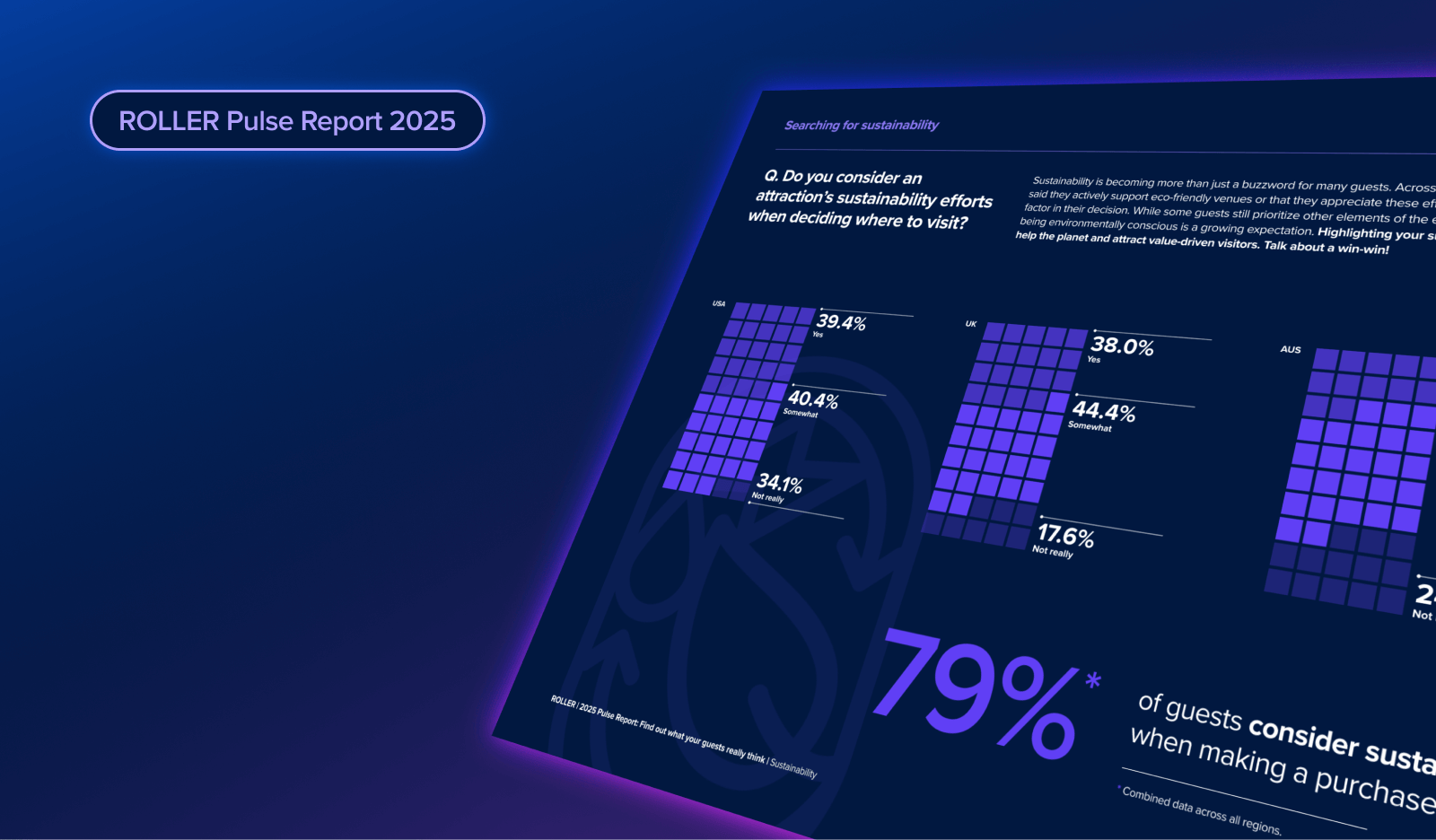5 Must-Have Customer Service Qualities & How To Develop Them

70% of consumers decide whether or not they want to buy from a business based solely on the quality of customer service.
Customer service is just as important as the rides and attractions your guests experience in venue.
So how do you ensure that your staff always treats your guests in a way that they remember fondly and tell their friends and family about afterward? Help your team develop essential customer service qualities that make them stand out! Read on to find out how you can do this at your workplace.
1. Patience
Let’s face it — if you work in customer service, there’s a fair chance you will receive at least one complaint from a less-than-happy customer before the workday ends.
People come to leisure venues to let their hair down, and when they feel that something is getting in the way of this, it is sometimes harder for guests to accept this obstacle during a day out, as opposed to in a work setting, where they might be expecting problems to arise. This can make guests even more challenging for your staff.
The key? Patience. And knowing that they can’t control guests, they can only try to problem-solve to the best of their ability. Patience gives the guest a better customer service experience, and it is also better for your staff's health.
How to be more patient
In the moment, pausing and incorporating breathing exercises can help diffuse internal tension.
But in the long term, you can help your staff develop patience by implementing related training courses, bringing in speakers on the topic, and ensuring that you carve out time for professional development to allow your team to engage in these career-building activities.
Outside of work, patience affects almost every part of our lives, so equipping your employees to build this quality is a great thing you can do for them, not only as your employees but for them as people too.
2. Empathy
From the same family as patience is empathy.
Empathy is not sympathy in that sympathy carries with it almost a feeling of pity for the other. In contrast, empathy is understanding the other person's feelings more deeply. Empathy is sitting in the mud with you when you’ve fallen over, and sympathy is saying, ‘sorry you’ve fallen.’
The distinction is essential because ‘sorry you’ve fallen’ can incite feelings of contempt and annoyance from the other party and sometimes worsen the situation. Your guests don’t want to hear that you’re sorry they feel how they feel about your venue — they want you to understand, apologize, and make it better.
Having empathy for your guests, especially when they complain, makes them feel seen and like their feedback is valid.
How to lead with empathy
88% of guests say a business's customer experience is as important as its products or services. More than anything — the time and money they lost, the inconvenience, etc. — your guests care more about how they feel when interacting with your venue and your staff.
Train your staff to have empathy, and through that, try to understand where the guest is coming from so they can treat guests in the best way possible.
Help them develop this quality, encourage it, and coach them to use it as often as possible. You can do this in many ways, including rewarding excellent customer service instances where staff used empathy to deliver a great result.
3. Active listening
Do you know someone who’s a great listener? Isn’t it just fantastic talking through things with them? Do they make you feel heard and not crazy, and like there is a solution to every problem, no matter how big and world-crushing it can seem at that moment?
That’s how your customer service team should strive to make your guests feel. When your guests feel like they’ve been heard, it alleviates half of the emotional stress that comes with them making the complaint in the first place. They complain because they want to be understood, and they want a resolution. So the first step is for your staff to listen and understand everything around what has happened.
How to listen actively
Active listening is listening intently to someone's problem to find a solution for it. It is listening to deeply understand the other person's point of view to help them with their problem and not listening merely to respond or blame-shift. In active listening, it is advisable to not just listen to the words being said by the guest but also to take cues from their body language and facial expressions too.
A way that you can help develop this is to workshop scenarios in your workplace. Role-play and have your staff practice active listening and help them grow and hone this skill so they are ready to execute this skill incredibly well the next time they come into contact with guests.
Active listening is also great for your staff to use in general conversions with your guests, not just for dispute resolution, so encourage your team to use this skill as much as possible.
4. Clear communication
Perhaps more than in any other profession, communicating clearly and unambiguously as a customer service representative is important.
Giving unclear answers, mumbling, or using incorrect language and tone can significantly affect how your guests perceive your customer service.
Imagine a prospective guest calling your customer service team asking about opening hours during the school holidays and getting a response from your team member saying something along the lines of, “yes, we’re open during the school holidays; you can find the times on our website” mumbled, and in an uninterested tone.
Here, the question was not answered sufficiently, and the tone was not friendly — leaving your guest feeling like a disturbance and likely also a little annoyed. If this was their first interaction with your business, it could easily deter them from wanting to attend your venue at all.
How to communicate more clearly
Tell your team how important clear, informative, and friendly communication is to your guests.
Something you could suggest might be to ask your staff to imagine, whenever they are speaking to a guest, whether in person, over the phone, email, or SMS, that they are talking to someone they care for — a family member or a friend.
How would they react if a good friend asked them for help or information or even had a complaint about their service? Teach them to give guests the same, or at least similar, compassion and grace they would give someone close to them. The more that they practice this, slowly this approach will ingrain itself into all of their guest interactions.
5. Dispute resolution and troubleshooting skills
Quality, effective dispute resolution is crucial — it can be the difference between a guest that affects your reputation by posting negatively about you online to a dissatisfied guest that has their dispute resolved and goes on to speak highly of your customer service team.
The best approach is to deal with guest complaints and issues head-on. Don’t make the customer feel bad for complaining, don’t invalidate, and certainly don’t engage in any heated discussions.
Your guests' complaints are all about perception. Where one person may view a 10-minute wait time as far too long, another may find this waiting time just fine. The customer service representative's job is to get to the root of the complaint, i.e., uncover the perception of the complaint.
How to navigate conflict
Train your staff to approach complaints in the following way:
- What is the actual complaint? I.e., The wait times were too long.
- Actively listen to understand the complaint, don’t listen just to respond.
- Have patience and empathy and troubleshoot by kindly asking further questions to establish why the guest feels the way they do.
- Formulate a kind and unambiguous response to diffuse the situation and make the guest feel better.
Excellent customer service = happy guests
How often can you remember visiting a venue and noticing how the staff treated you? Almost every time? And have you ever left a place with a friend and said, “the venue was great, but the service was lacking — let’s try somewhere else next time?”
Customer service is always noted. Ensure that your team is trained well, shows your guests patience and empathy, listens well, communicates clearly, and consistently finds the most suitable resolutions to your guests' queries. If they do this, your guests will surely remember and recommend you to others.
Related articles

.png)
What the 2025 Pulse Report Reveals About Guest Booking Behavior at Attractions

2025 Pulse Report: How Sustainability Is Shaping Guest Expectations
Enhance your guest experience
Get free education, tips and inspiration to help you run a successful venue.